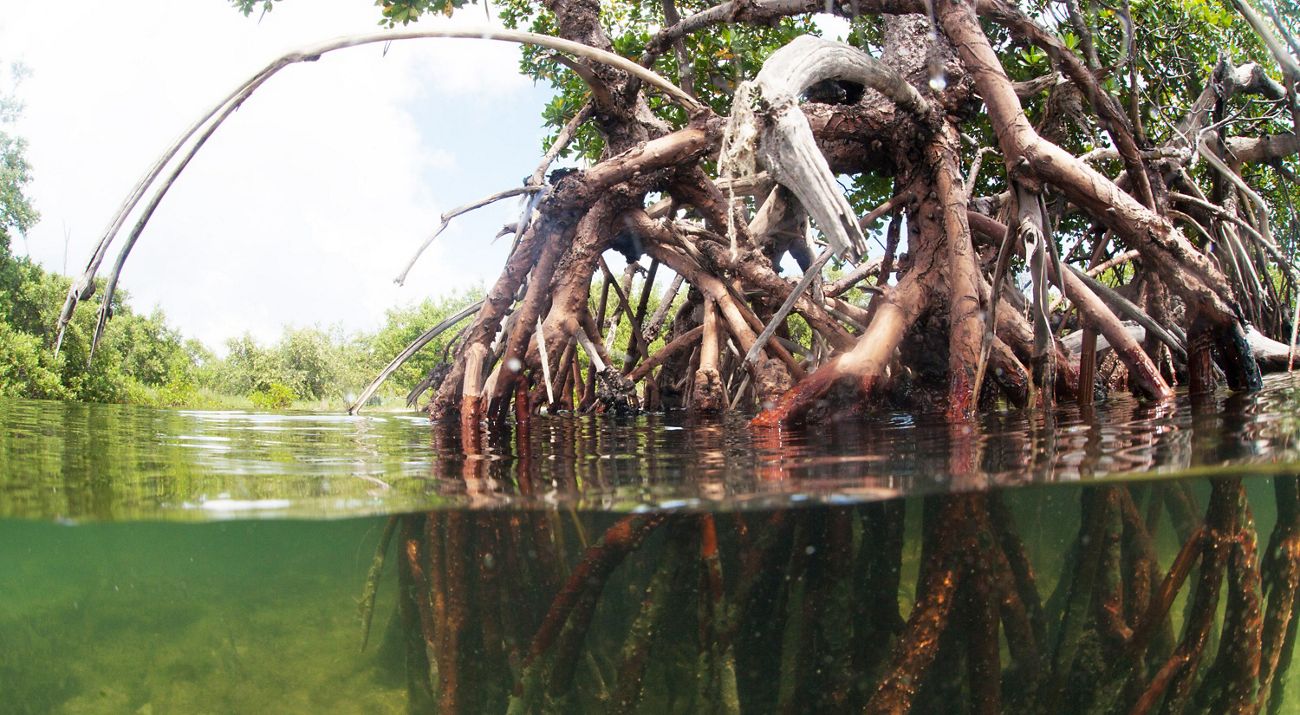The Green Climate Fund (GCF) is the world’s largest fund dedicated to helping developing countries adapt and respond to climate change. It was established in 2010 by the 194 countries which are signatories to the United Nations Framework Convention on Climate Change (UNFCCC). The GCF supports the efforts of developing nations in meeting climate goals by using public resources to fund ambitious mitigation and adaption work. The funds seeks to stimulate private finance and large scale investment.

Contact TNC's Green Climate Fund Unit
Email UsWhy is TNC an accredited entity?
The Green Climate Fund does not directly implement projects, but partners with Accredited Entities to achieve its goals. The Nature Conservancy became an Accredited Entity in March 2023, having met the GCF’s rigorous standards for project management, granting, blended financing, environmental and social safeguards, and gender mainstreaming.
TNC continues to build on an extensive portfolio of projects and partnerships spanning 79 countries and more than 60 years of experience in developing financial instruments and cutting edge projects.. TNC works alongside governments and many local and international partners to develop nature-based solutions that are central to large-scale, transformative work. As an Accredited Entity of the Green Climate Fund, we are part of a critical partnership that helps us scale up climate impact in partnership with participating nations and local partners.
TNC’s policies and procedures for Green Climate Fund projects ensure a consistent approach to project development and implementation aligned with TNC’s code of conduct and core values, including our commitment to equity and respect for human rights. The policies are designed to ensure quality in the delivery of project activities, with robust measures for environmental and social risk due diligence, monitoring, evaluation, and learning, fiduciary standards, and a responsibility to meaningful engagement with local communities, underpinned by our environmental and social safeguards performance standards, gender guidance, and project-level grievance policies.
These policies and procedures are iteratively revisited and revised consistent with GCF requirements and industry standards, as well as internal review processes for performance improvement and growth. Our policies and procedures will also be responsive to the needs of the communities we work with to the furthest extent possible.
The latest version of the policies and procedures were approved by TNC leadership in February 2023. Updates to policies and procedures will be documented and disclosed on this webpage.
- TNC Code of Conduct
- GCF Policy on Prohibited Practices
- TNC Purchasing SOP
- TNC-GCF Procedure - Granting and Awarding GCF Funds
- Annex to TNC-GCF Procedure - Guidelines for contractual default and termination
- Annex to TNC-GCF Procedure - Guidelines on Dispute Resolution during the procurement phase
- TNC-GCF Independent Monitoring and Evaluation Policy
- TNC-GCF Monitoring and Evaluation Disclosure Policy
- TNC-GCF Information Disclosure Policy
Environmental and Social Safeguards and Gender Policies and Procedures:
- TNC-GCF Assessment and Management of Environmental and Social Risk and Impacts (i.e., “The ESS Performance Standards”)
- TNC-GCF Environmental and Social Management System: A Handbook for GCF-Funded Projects (i.e., “The ESMS Handbook”)
Upcoming
TNC Code of Conduct
TNC Code of Conduct provides the principles and expectations to guide staff, Board members, Trustees/Advisors, volunteers, and third-parties in the course of their work for TNC. One of those expectations is that TNC staff and others acting on our behalf will comply with all applicable laws, rules, and regulations in each country, state, or locality where TNC operates. Where TNC’s Code or policies are more protective than the laws and customs in certain countries, TNC staff and others acting on our behalf will be held to the higher standards set forth in our Code.
Grievance Mechanism
TNC’s approach regarding grievances related to TNC’s GCF-funded projects is designed to receive and address complaints pertaining to TNC GCF-funded projects and raised by applicable stakeholders. TNC’s begins with each project having a tailored, project-specific and culturally appropriate way of processing grievances locally and informally, if desired by the stakeholders with the concern, before filing a more formal grievance. Formal steps will be scaled to the risks and scope of the project, and adapted to local laws if local laws mandate any specific requirements, culminating with the right to file a written or oral complaint with TNC’s Chief Ethics and Compliance Officer. Information about these steps will be made available to the applicable stakeholders by TNC project teams after a preliminary stakeholder analysis is conducted.
Any formal grievances may be filed with TNC’s Chief Ethics and Compliance Officer. The Office of the Chief Ethics and Compliance Officer can be reached at:
Mailing Address:
Linette Hwu
Office of Ethics and Compliance, GCF Grievance
The Nature Conservancy
4245 North Fairfax Drive, Suite 100
Arlington, VA 22203-1606, USA
Email: compliance@tnc.org
Phone: +1 (703)841-5300
TNC Helpline
Staff and third parties may contact the Ethics & Compliance team anytime to submit a question or concern at our online Helpline. The TNC Helpline is available online or by phone 24/7/365 in a variety of languages. In the US, you can call 1-(833) 426-1404. Our Helpline page has phone numbers for international calling.
Please visit the ‘Annex to Procedures for Policy on Grievance Mechanism’ in our Assessment and Management of Environmental and Social Risks and Impacts for TNC’s full grievance policy for GCF-funded projects.
Filing Criteria
What Kinds of Grievances Are And Are Not Eligible Under The Formal Grievance Phase For GCF-Funded TNC Projects?
As stated above, the formal phase of the grievance mechanism is established to receive and resolve the following:
- Grievances related to TNC’s failure to comply with policies enumerated in this document;
- Grievances related to violations of Green Climate Fund policies, including the IFC Performance Standards on Environmental and Social Sustainability if applicable to GCF-funded projects; or
- Grievances related to TNC’s actions inconsistent with the UN Declaration on the Rights of Indigenous Peoples.[1]
The following issues are not eligible:
Grievances filed:
- More than 30 days after the date of the official closure of the project; or
- 18 months after the date of the official closure of the project in cases where the complaint addresses an impact resulting from project activities that was not, and reasonably could not have been, known prior to or on the date of official closure;
- Grievances that relate to the laws, policies, and regulations of the country, unless they relate directly to TNC’s failure to comply with these principles and guidelines in connection with the specific project;
- Grievances where the Affected Party has not made good faith efforts to address the problem with TNC’s project team or Business Unit staff unless reasonable fear of retaliation or safety concerns caused the Affected Party to escalate to a higher level;
- Grievances about the adequacy or suitability of TNC’s ESMS policies or procedures;
- Grievances that are frivolous, malicious, duplicitous, trivial, that lack minimal specificity about the type of impact, or are intended to gain competitive advantage;
- Grievances that relate to TNC’s non-project-related administrative matters, such as finance, human resources and general administration;
- Grievances submitted by the Affected Party on matters it submitted to the grievance mechanism earlier, unless new substantive evidence is provided;
- Grievances that relate to fraud or corruption, which should instead be directed to TNC’s Ethics & Compliance Helpline or reported directly to the TNC Chief Ethics and Compliance Officer;
- Grievances that relate to the procurement of goods and services (but not related to fraud or corruption), which should instead be directed to the TNC office responsible for the particular procurement; and
Any other grievance not explicitly listed in the list of resolvable grievances.
Information Needed to File A Grievance
The following information will be requested to file a formal grievance and may be submitted in writing, dictated or recorded in the Affected Community’s preferred language:
- Affected Party’s name and contact information.
- If not filed directly by the Affected Party, proof that the representative has the authority from the Affected Party or by operation of law to represent the Affected Party.
- The specific GCF-funded TNC project or program of concern, including region, country and TNC local contact.
- If the filing party has not been previously identified by TNC as a representative of an Affected Community through the pre-engagement stakeholder analysis process, proof that the party and representative has appealed for classification as an Affected Community.
[1] See U.N. Declaration on the Rights of Indigenous Peoples in supplemental materials for more information.
- The alleged or perceived violation and the harm that is or may be resulting from the violation with reasonable detail or description about the violation and harm.
- Any other relevant information or documents (e.g., date of event).
- Any actions taken so far to resolve the problem, including contact with TNC at the project or Business Unit level.
- Whether confidentiality, to the extent available given GCF reporting requirements, is requested and the reason for the request.
If a grievance is filed using TNC’s Ethics & Compliance Hotline, this information should be provided in the description of the conduct.
Review and Resolution Process
What Is The Process For Resolving A Formal TNC-GCF Funded Project Grievance?
- The Chief Ethics and Compliance Officer receives a grievance and determines eligibility.
- The Chief Ethics and Compliance Officer will acknowledge receipt of the complaint within 48 hours (if the 48 hours run during a local business day) or 48 hours and one business day (if at least 24 hours don’t run during a business day).
- Within 10 business days of receipt, the Chief Ethics and Compliance Officer will assess eligibility and provide a response to the Affected Party or representative as to whether or not the complaint raises an eligible grievance.
- If the grievance is eligible, the Chief Ethics and Compliance Officer will notify TNC’s project team, Business Unit manager and report to the TNC GCF Coordination Unit at the same time as informing the Affected Party or representative;
- If confidentiality has been requested and granted, the Chief Ethics and Compliance Officer will communicate the determination of eligibility to the Affected Party and to the TNC project team and Business Unit manager to the extent possible without breaching confidentiality.
- The Chief Ethics and Compliance Officer will also notify the TNC Chief Diversity, Equity & Inclusion Officer, the appropriate TNC legal counsel and any other senior leaders relevant to the grievance, to the extent possible without breaching confidentiality (if applicable).
- Within 10 business days of receiving notice from the Chief Ethics and Compliance Officer, TNC’s project team or Business Unit manager will provide a response stating their view of the situation, the complaint, the alleged or perceived violation and harm.
- The Chief Ethics and Compliance Officer will communicate appropriate information received from TNC’s project team or Business Unit manager to the Affected Party or representative within 10 business days of receipt of the response.
From this point forward, there are two possible pathways to resolution, as recommended by the Chief Ethics and Compliance Officer.
Party-Led Resolution
- If there is no request for confidentiality or if confidentiality can be accommodated, and the Chief Ethics and Compliance Officer sees an unlikely risk of retaliation or other reason not to recommend the parties be in renewed contact about the issues, she/he may recommend that TNC’s project team or Business Unit manager look into the matter by investigating the issues raised and opening a dialogue with the Affected Party, and, at his or her discretion, other validly concerned parties about the complaint.
- Assuming direct contact for attempted resolution is appropriate, TNC’s project team or Business Unit manager will work with the Affected Party and at his or her discretion, to co-create an approach to resolve the issues identified. The Chief Ethics and Compliance Officer may assist by facilitating dialogues, promoting information sharing, undertaking joint fact-finding, using culturally appropriate approaches to problem-solving or providing mediation or facilitation resources if approved by the Affected Party. If appropriate, the Chief Ethics and Compliance Officer may offer resources to further clarify, assess and resolve issues, including the engagement of outside experts and translation services.
- If agreement on the approach is reached, TNC’s project team, TNC Business Unit manager and the Affected Party will develop an action plan and timeframe, to resolve the issues identified within 30 days from the date of the last communication by the Chief Ethics and Compliance Officer under ‘Section 9.5.1 What is the Process for Resolving a Formal TNC GCF-Funded Project Grievance?’ of the Assessment and Management of Environmental and Social Risks and Impacts for GCF-funded projects. TNC’s project team or Business Unit manager will:
- summarize the suggested resolution of the grievance, including concerns raised, actions taken, conclusions reached, action plan and timeframe, method and frequency for tracking and evaluating progress, and mechanisms for compliance with/enforcement of the agreed-upon resolution;
- communicate the resolution to the Chief Ethics and Compliance Officer; and
- document communication of the resolution to the Affected Party.
If agreement cannot be reached, TNC and/or the Affected Party will inform the Chief Ethics and Compliance Officer who will take further action (see below).
TNC Chief Compliance Offer-Led Resolution
- If a Party-Led Resolution is contra-indicated because confidentiality does not permit it, or a Party-Led Resolution has been refused by the Affected Party, or the Affected Party requests a decision by the Chief Ethics and Compliance Officer instead of a Party-Led Resolution, or the Party-Led Resolution was unsuccessful, the Chief Ethics and Compliance Officer will conduct fact-finding with the Affected Party and the TNC project or Business Unit. Fact-finding will be conducted in a reasonable manner that does not affect the confidentiality or reserve of TNC data, documentation and personnel and that does not affect or unduly burden its normal operations and activities.
- At its discretion, the Chief Ethics and Compliance Officer may engage a third party investigator to carry out a compliance review and in-depth investigation of the issues and their root causes, and develop a plan for corrective action. The investigation may involve fact-finding through interviews with the potentially Affected Party, TNC’s project team, Business Unit staff and relevant stakeholders; comprehensive information-gathering; and in-country inspections if needed.
- Following the investigation, the Chief Ethics and Compliance Officer will develop draft findings, a proposed approach to resolution and an action plan and timeframe, a method and frequency for tracking and evaluating progress, and mechanisms for compliance with/enforcement of the resolution.
- The Affected Party, TNC’s project team and Business Unit manager will have 10 business days to respond to the Chief Ethics and Compliance Officer's proposal.
- Within 10 business days of the receipt of the responses or the due date for responses, the Chief Ethics and Compliance Officer may revise the draft proposal and then will issue a decision to the Affected Party, TNC’s project team and Business Unit manager. TNC’s project team, Business Unit manager and the Affected Party are expected to implement the action plan in the decision.
- The Chief Ethics and Compliance Officer will monitor implementation of the action plan and check in regularly with the Affected Party as specified in the action plan.
- When the action plan is completed, the Chief Ethics and Compliance Officer, TNC’s project team, Business Unit manager, and the Affected Party will determine if the grievance has been resolved. If yes, the lessons learned will be incorporated into the project and shared with other TNC programs as appropriate. If no, the Chief Ethics and Compliance Officer or Affected Party or representative may suggest additional actions to the parties or may conclude the grievance after determining that all feasible actions have been taken.
At the conclusion of either the Party-Led Resolution or Chief Ethics and Compliance Officer-Led Resolution, the Chief Ethics and Compliance Officer will prepare a final report and submit it to all parties involved in the grievance process and the GCF Secretariat or applicable office.
More Climate Stories

How Farmers in India’s Breadbasket Are Fighting Climate Change and Saving Their Air
Millions of Indian farmers burn their fields, emitting millions of tons of carbon and pollutants. TNC and partners are helping farmers stop burning by using planet-friendly practices.
By Adam Bloom

Belize Debt Conversion Case Study
Learn about NatureVest and The Nature Conservancy's Belize sovereign debt conversion.

The Key to Climate Action Hidden in Africa’s Forests
How a new business accelerator aims to scale up a critical natural climate solution
By Edwin Macharia
